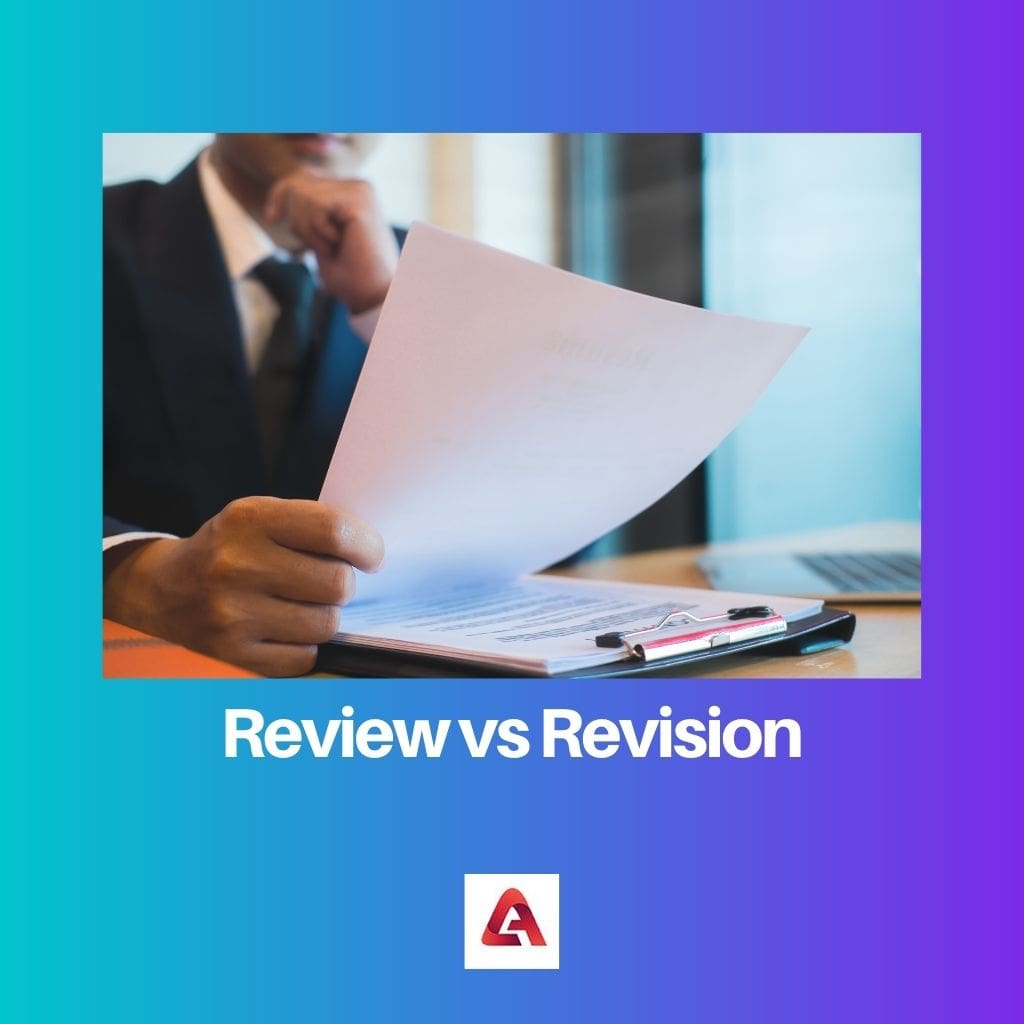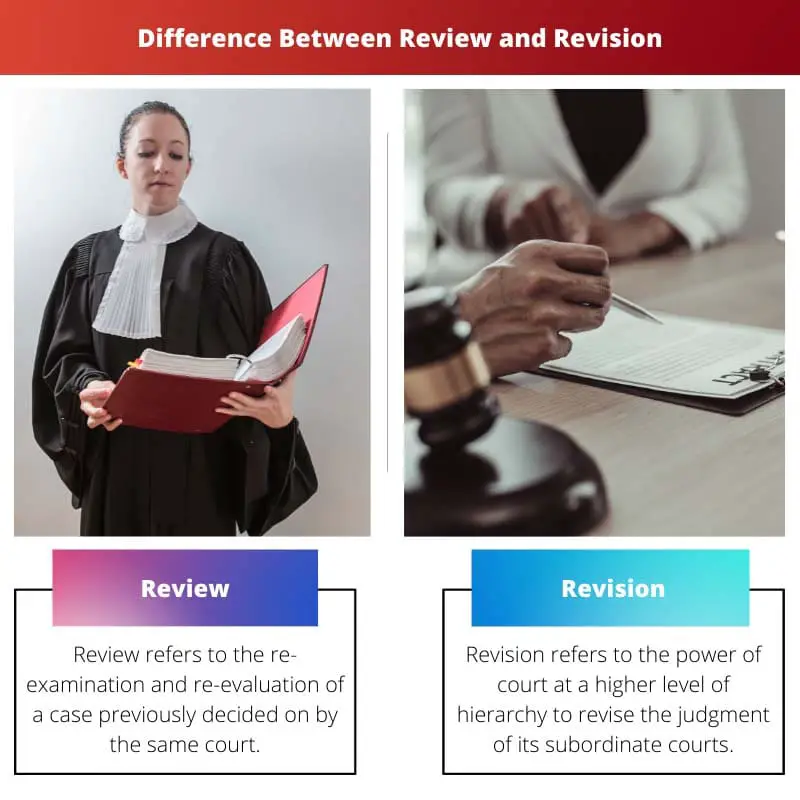Both the terms under consideration are significant provisions of the Civil Procedure Code of India and the Constitution(for Supreme Court). Indian judiciary is well equipped with provisions to correct its mistakes and deliver justice.
After the judgment is passed, the court itself has the power to review or revise its decisions. The aggrieved parties can also file a review or revision petition.
Key Takeaways
- Objective: Reviewing involves evaluating and assessing an original work, while revision entails modifying and improving the work.
- Scope: Review may identify errors, inconsistencies, or areas for improvement, while revision focuses on making changes to content, structure, and clarity.
- Process: Review is an analytical process, involving an external perspective, while revision is an active process of rewriting or editing the original work.
Review vs Revision
Review refers to the process of examining or assessing something carefully with the intention of evaluating its quality, effectiveness, or suitability. Revision involves making changes or improvements to something in order to correct errors, enhance its quality, or better meet its intended purpose.

Comparison Table
| Parameter of Comparison | Review | Revision |
|---|---|---|
| Definition | The review refers to the re-examination, and re-evaluation of a case previously decided on by the same court. | Revision refers to the court’s power at a higher level of hierarchy to revise the judgment of its subordinate courts. |
| Section | Review power is mentioned in Section 114 of the Civil Procedure Code of India (1908) and Article 137 of the Constitution (for the Supreme Court) | The provision of Revision is mentioned in Section 115 of the Civil Procedure Code of India (1908). |
| Type of Appeal | It is an intra-court provision; it can be filed only in the court that passes the original decree. | It is an inter-court provision; that is, it is filed against the decision of one court in the other, higher-level court. |
| Applicability | The Review petition can only be filed if no appeal has been filed earlier or the judgment does not allow an appeal. | The Revision petition is filed in case of misuse of jurisdictions by a subordinate court. |
| Grounds | The court entertains a Review if any new evidence or erroneous misinterpretation of any fact is discovered. | The incident of any uneven, improper, or unfair decree by the subordinate courts. |
| Scope | The court isn’t allowed to start the case afresh; it can only rectify the errors in the deliverance of justice. | The higher court can interfere only in a proven case of irregular, improper, or illegal use of power. |
| Instances | The Supreme Court agreed to review its verdict on Sabarimala Case. | A Revision was filed in Amir Hasan v. Sheo Baksh Singh. |
| Time Limit | Any such Review petition must be filed within 30 days after the court’s decree is passed. | Any Revision petition must be filed within 90 days after the court’s decree. |
What is Review?
An aggrieved person can file a Review petition if any new evidence or erroneous misinterpretation of any fact is discovered. Under this provision, the court has the right and power to reconsider its judgment.
The provision is mentioned in Section 114 of the Civil Procedure Code and Article 137 of the Constitution (for the Supreme Court). It is an intra-court provision and must be filed within 30 days immediately after the judgment.
A Review is applicable when a person believes that he is aggrieved and:
- A civil court has passed the order, and an appeal is allowed, but no appeal is filed before filing the review petition.
- A Civil court has passed the order, and no appeal exists/allowed.
The grounds entertained under a Review petition are:
- Detection of a new and crucial piece of evidence that could be produced when the judgment was passed.
- If any loopholes in the records are sighted.
- Or any other reason that the court deems fit.
The court is allowed to correct significant errors and not minor/negligible mistakes. It cannot start the case again from scratch but can only rectify errors that occurred in the deliverance of Justice.
A Review petition is subject to some limitations:
- The court order on the application of Review (acceptance or rejection).
- The decree of the court on a Review petition filed earlier.

What is Revision?
Revision is the power of a higher court to order records and facts from a subordinate court. In this case, the higher court can revise the faulty judgment by its subordinate. It is an inter-court provision.
The provision is mentioned in Section 115 of the Civil Procedure Code. The petition can only be applicable if there is no appeal to the High Court and is filed within 90 days after the judgment.
The higher court can call for records of a decree by any subordinate court if it appears that:
- The lower court has overused jurisdictions.
- The lower court has disused its jurisdictions.
- The court has acted unfairly and illegally.
The High Court can not interfere with the functions and procedures of subordinate courts until it is evident and proven that the judgment is capable of causing irrevocable trauma. The Court can’t correct any error of facts or law until the time the decision of the court falls out of its jurisdiction.

Main Differences Between Review and Revision
- The Review petition includes the re-examination of a case by the same court. In contrast, the Revision petition challenges the decision of a civil court in another court that is placed at higher levels of the judiciary hierarchy. Review is an intra-court provision, whereas Revision is an inter-court provision.
- A review is filed when new and crucial evidence is discovered or when the court realizes some error in the analysis of facts. In contrast, Revision is petitioned if the higher court acknowledges any misuse or disuse of powers and jurisdictions by a subordinate court.
- Review powers are mentioned in Section 114 of the Civil Procedure Code of India and Article 137 of the Constitution (for the Supreme Court). Revision powers are documented in Section 115 of the Civil Procedure Code of India.
- The review may or may not be applied to judgments subject to appeal, but Revision is only involved for cases that do not allow an appeal.
- The time limit to file a Review is 30 days, while it is 90 days to file Revision.

- https://heinonline.org/hol-cgi-bin/get_pdf.cgi?handle=hein.journals/arzjl1982§ion=8
- https://digitalcommons.law.uw.edu/cgi/viewcontent.cgi?article=1985&context=wlr
Last Updated : 13 July, 2023


Emma Smith holds an MA degree in English from Irvine Valley College. She has been a Journalist since 2002, writing articles on the English language, Sports, and Law. Read more about me on her bio page.

The article effectively distinguishes between review and revision, providing an insightful perspective on the legal processes. It’s a compelling read for anyone interested in law and justice.
I couldn’t agree more, Katie Hunt. This article is a testament to the depth of knowledge and expertise of the author.
Absolutely, Katie Hunt. The article’s comprehensive analysis of legal provisions is truly enlightening.
This article is incredibly informative and sheds light on the lesser-known aspects of the Indian legal system. It’s a valuable resource for anyone interested in understanding the intricacies of the judiciary.
Absolutely, Vbutler. This article is a testament to the depth of knowledge and expertise of the author. I’ve learned a great deal from reading it.
The article delivers its content in a clear, precise, and concise manner. It’s a refreshing change to read legal information presented with such clarity.
I share your sentiments, Hollie97. Legal topics can be convoluted, but this article’s clarity makes it exceptionally engaging.
The article’s succinct and articulate presentation of legal concepts is indeed commendable. It’s an exceptional piece of work.
The article provides a comprehensive and detailed explanation of the difference between review and revision. It’s enlightening to understand the legal provisions that allow the Indian judiciary to correct and improve judgments.
I totally agree with you, Mohammed. The article breaks down complex legal concepts and makes them accessible to all readers. Great job!
While the article is undoubtedly informative, it presents a slightly biased view of the Indian judiciary. It would have been beneficial to explore potential criticisms or limitations of the review and revision processes.
I see your point, Uthomas. A more balanced approach to discussing the Indian legal system could enhance the overall credibility of the article.
While the article provides valuable insight into the legal processes of review and revision, it would have been beneficial to include practical examples or case studies to enhance its applicability.
I completely agree, White Keeley. Real-life examples would have added a practical dimension to the article’s content.
The author’s explanation of the legal provisions for review and revision is both comprehensive and accessible. It’s remarkable how the article demystifies complex legal concepts.
I couldn’t agree more, Jennifer93. This article simplifies intricate legal processes and makes them understandable for a wider audience.
The article presents a comprehensive and detailed analysis of the legal provisions for review and revision. Its clarity and depth make it a compelling read for those interested in the Indian judiciary.
Absolutely, Heather Price. The article’s thorough examination of legal processes is truly commendable.
The article’s meticulous comparison of review and revision is highly informative and engaging. The author’s expertise in legal matters is clearly evident.
I share your views, Tara87. The depth of analysis in this article is truly impressive.
This article provides a clear and detailed breakdown of the review and revision processes. It serves as a valuable reference for legal professionals and students alike.
Absolutely, Abigail73. The depth of information and clarity in this article is truly commendable.